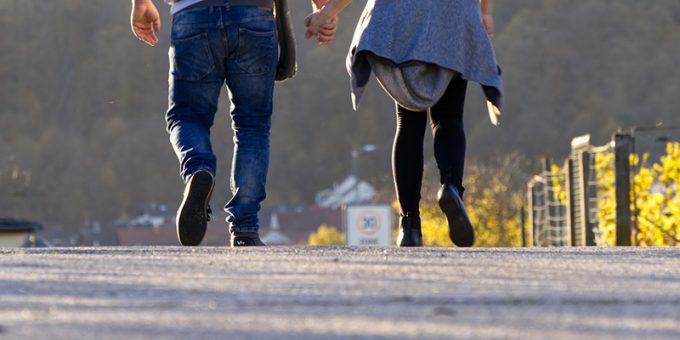
WEST LAFAYETTE – If you walk with your spouse or partner on a regular basis, you might want to speed up. Or tell them to.

A new study by Purdue University nursing, health and kinesiology, and human development and family studies researchers shows that couples often decreased their speed when walking together. Speed further decreased if they were holding hands.
The study looked at walking times and gait speeds of 141 individuals from 72 couples. The participants ranged from age 25-79 and were in numerous settings, including clear or obstacle-filled pathways, walking together, walking together holding hands and walking individually.

“In our study, we focused on couples because partners in committed relationships often provide essential support to promote one another’s healthy lifestyle behaviors, including exercise,” says Melissa Franks, associate professor of human development and family studies.

Libby Richards, associate professor of nursing, says, “We were hoping that there would not be a reduction in speed where partners walked together. We hoped that slower partners would speed up to match the faster partner, but that was not the case. However, it’s important to note that any physical activity or walking – regardless of speed – is better than none.”
Richards says it is common for people to walk or exercise with a spouse, partner or friend, as it increases one’s likelihood to be active, especially as Americans are encouraged to meet a goal of 150 minutes of moderate activity every week.
“If someone substantially slows down when they are walking with someone else, that could negate some of the health benefits recognized if they walked alone at a faster pace,” Richards says.

Shirley Rietdyk, professor of health and kinesiology who specializes in biomechanics, says there are many reasons to measure gait speed.
“Gait speed is important to measure because it is related to overall health. Typical gait speed is predictive of fall risk, functional ability, disability recovery and mortality,” Rietdyk says.
“Common exercise interventions, including strength, coordination and multimodal training, are all effective in increasing gait speed. These interventions can also delay the onset of slower gait speed and help slow the loss of gait speed. No one type of training is better than the other, so do the activity you are most likely to stick with.”
While walking is one of the easiest activities, people tend to walk slower as they get older and may have to find other fitness routines to stay active.
“Older adults who are more active tend to maintain their gait speed,” Rietdyk says. “In other words, slower gait speed is not an inevitable aspect of aging. Older adults who walk slower tend to have poorer health and lower functional status.”
The article appeared in a recent edition of Gait & Posture.
HyeYoung Cho, a recent Ph.D. graduate of Purdue’s Department of Health and Kinesiology; Anna Forster, a Ph.D. student in Purdue’s School of Nursing; and Sharon Christ, associate professor of human development and family studies, were on the research team, all from Purdue’s College of Health and Human Sciences. All research team members are members of Purdue’s Center on Aging and the Life Course. The Purdue Center for Families and the American Nurses Foundation funded the study.
About Purdue University
Purdue University is a top public research institution developing practical solutions to today’s toughest challenges. Ranked the No. 5 Most Innovative University in the United States by U.S. News & World Report, Purdue delivers world-changing research and out-of-this-world discovery. Committed to hands-on and online, real-world learning, Purdue offers a transformative education to all. Committed to affordability and accessibility, Purdue has frozen tuition and most fees at 2012-13 levels, enabling more students than ever to graduate debt-free. See how Purdue never stops in the persistent pursuit of the next giant leap at https://purdue.edu/.
Information Matthew Oates, oatesw@purdue.edu, @mo_oates, sources: Libby Richards, earichar@purdue.edu, @LibbyAnnR1; Shirley Rietdyk, srietdyk@purdue.edu; Melissa Franks, mmfranks@purdue.edu



